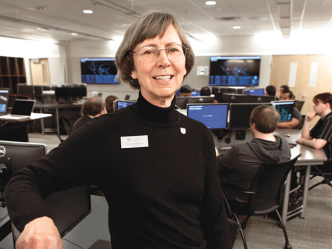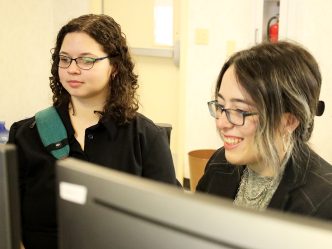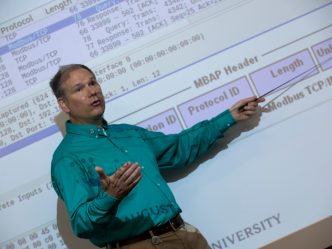Fresh off the heels of another successful Cyber Education Summit in October, the Georgia Regents University Cyber Institute is looking forward to several big milestones coming up next year.
The Cyber Institute was created in May 2015 and the first director, Joanne Sexton, was named in July.
Sexton, who holds master’s degrees in computer science and national and strategic studies, is a Certified Information Systems Security Professional and has earned Global Information Assurance Certifications in several areas of cyber defense. With more than 20 years of information technology experience in the Navy, her knowledge of the industry as well as her leadership skills made her the right choice to steer the new institute forward.
The Institute has already had a busy, but fruitful year! Sexton is proud of several early achievements including hosting the university’s first precollegiate Cyber Sciences Summer Academy and having its efforts acknowledged before the House Intelligence Committee . “And that’s only the beginning,” Sexton said.
The institute’s offices are set to open on the Summerville Campus in late spring 2016, paving the way for further growth of the university’s cybersecurity education initiatives. The Institute will be located on the first-floor of University Hall. It will have administrative offices for the institute staff, office space for faculty and a new cyber classroom and student lab.
Karen Ribble, project manager in the Division of Institutional Effectiveness assigned to assist with the university’s cyber-related efforts, said the new lab, one of three special purpose teaching labs in University Hall, will provide additional lab space as well as resources to begin teaching students remotely.
“There are two existing computer labs in University Hall, now,” she said. “What’s really great about this new lab is that it will provide the infrastructure for us to teach a highly specialized curriculum related to cybersecurity for about 100 students at the same time, both face-to-face and online.”
Ribble said the space also provides a more central location for cybersecurity students, faculty and administrators to work and study.
The next step for the institute is attaining National Center of Academic Excellence in Cyber Defense Education (CAE‐CDE) designation. The goal of the CAE-CDE program is to reduce vulnerability in the United States’ national infrastructure by promoting higher education and research in cyber defense and to produce a growing number of cybersecurity professionals. This accreditation is sponsored jointly by the National Security Agency and the Department of Homeland Security.
The CAE-CDE designation application focuses on how our curriculum aligns with their expectations. “We’re currently in the process of going through the application where Ms. Sexton and other faculty are mapping our curriculum to the curriculum expected by the CAE program,” Ribble said.
“Two-year universities have to focus on courses which support student learning outcomes such as basic data analysis and information assurance,” she said. “Universities, such as GRU, must include the identification of courses that provide student learning outcomes related to network technology and protocols, and digital forensics, which is already a strong focus of GRU’s current cyber curriculum.”
Currently, only two institutions in the state of Georgia – Columbus State University and Kennesaw State University – have CAE-CDE designation. The Georgia Institute of Technology is also designated as having a CAE that is focused primarily on cybersecurity research rather than classroom education initiatives.
According to the National Information Assurance Education and Training Program, only 129 institutions nationwide have CAE-CDE designations.
Ribble said attaining the designation is imperative to the institute’s continued success. “This designation will improve our overall national profile,” Ribble said. “It shows government agencies that we take our initiatives seriously and that we are committed to training the next generation of cyber warriors.”
In a parallel but separate effort, Dr. Carol Rychly, vice president for academic and faculty affairs, is assisting Sexton and the deans with a cluster hire of faculty for the institute. The intent is to hire six new faculty for next academic year that will provide opportunities for us to expand enrollment within existing programs as well as add new academic and professional continuing education programs.
Planning is underway to give students the opportunity to earn a Health Security Certificate, leveraging the university’s background as an academic medical center to provide a unique, and highly sought after, certification and also initiate a new graduate-level degree in Information Security Management.
Sexton is very grateful for all of the support that has enabled the Institute to achieve what it has already and also very optimistic about the future. She said, “Our early successes and ongoing efforts are the result of great support from our faculty and administrators. This, coupled with the support of local, state and national partners, ensures that the institute can fulfil its mission ‘to enable, support and champion meaningful, innovative, interdisciplinary research and education for cybersecurity with focus on collaborative partnerships that impact K-12 education, health care, and government, academic and business communities.’”
 Augusta University
Augusta University



